Brexit could prompt human rights crisis, lawyers warn
Open letter says Prime Minister must not be allowed to use leaving the EU as an excuse to also exit the European Convention on Human Rights

Support truly
independent journalism
Our mission is to deliver unbiased, fact-based reporting that holds power to account and exposes the truth.
Whether $5 or $50, every contribution counts.
Support us to deliver journalism without an agenda.

Louise Thomas
Editor
Top lawyers and legal experts have warned that Brexit could trigger a human rights crisis in the UK, with the Prime Minister “trading away protections against torture for grubby trade deals”.
The UK's departure from the European Union may go hand in hand with the removal of fundamental rights from British law, they said in a letter in the Observer, leaving its citizens with a similar level of protection to people in Europe's last dictatorship, Belarus.
Theresa May has stated in the past that she would like to leave the European Convention on Human Rights — described as “the bedrock of peace in Europe since the Second World War” — but the EU could intervene, the letter said, making remaining a signatory a condition of any free trade deal.
Signed by more than 50 prominent lawyers and academics, including Helena Kennedy, Sir Geoffrey Bindman, Professor Francesca Klug, Lord Lester and Sir Paul Jenkins, the letter states: “Theresa May has repeatedly stated her feelings that Britain would be better served by leaving the European Convention on Human Rights (ECHR) than it would leaving the EU. As we enter Brexit negotiations, there is now every possibility that both these scenarios could easily come to pass.”
It continues: “The ECHR has been the bedrock of peace in Europe since the second world war, and was instrumental in the remarkable growth of democracy in Eastern Europe after the fall of the Berlin Wall. It is no coincidence that the one state that is not part of the Convention, Belarus, is known as “Europe’s last dictatorship.”
The letter is expected to pressure Ms May to outline how exactly she will protect rights after Brexit.
Signing the ECHR is a condition of joining the EU, as stipulated in the Lisbon Treaty. The convention has been part of British law since it was ratified in 1951, and prohibits torture and slavery, while protecting the right to a fair trial and freedom of expression.
The letter’s signatories claim: “We face the very real threat of a human rights crisis with the UK trading away protections against torture for grubby trade deals with foreign tyrants. We are calling for the EU to make Britain’s membership of the ECHR a legally binding requirement for any future free trade deal with the UK. The rule of law and human rights are non-negotiable when new countries join the EU, they should be non-negotiable when countries leave and desire a free trade deal."
Because the ECHR is a separate entity to the EU, it is not necessary to leave it on departing the union. But it is likely the Prime Minister will take the opportunity to try and do so.
Many Conservative MPs, including Ms May, are disdainful towards British membership of the convention, which is enforced by the European Court of Human Rights, because they say it prevents dangerous foreign criminals and terrorists being tracked and deported.
Ms May was reportedly already planning on making the case to leave the ECHR a central aspect of her 2020 election campaign.
She would reportedly plan to transfer the rights from the convention into British law, to be applied by the Supreme Court.
But the Good Friday Agreement, a key aspect of the Northern Ireland peace process, also depends on the ECHR leading critics to say withdrawing from the Convention would be “playing with fire”.
If implemented, Ms May's plan would replace David Cameron’s plans to abandon the Human Rights Act for a British Bill of Rights. Unlike these previous proposals, where the European Court would have retained a role hearing appeals, Ms May is looking to break off all relations with the court.
Subscribe to Independent Premium to bookmark this article
Want to bookmark your favourite articles and stories to read or reference later? Start your Independent Premium subscription today.
Join our commenting forum
Join thought-provoking conversations, follow other Independent readers and see their replies
Comments